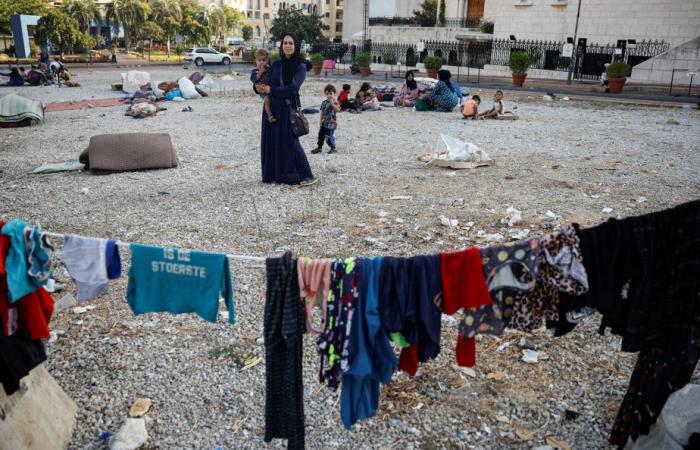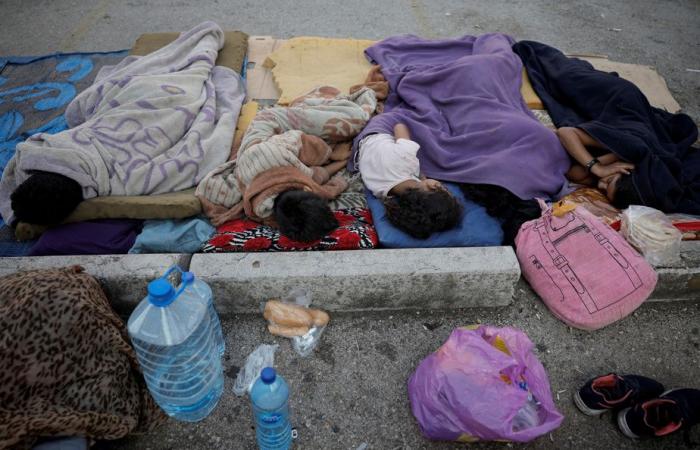(Beirut) “How are you?” » In Beirut today, this banal question triggers silence, a tired smile, sometimes tears. Exhausted by years of crisis, stunned by the war which strikes again, the Lebanese “can no longer do it”, worry mental health specialists.
Posted at 7:16 a.m.
Cécile FEUILLATRE
Agence France-Presse
A drawing by Lebanese illustrator Bernard Hage made an impression. Entitled “Lebanese cake”, it represents a cake with successive layers: “financial collapse, pandemic, explosion at the port, political impasse, collective depression”… and the cherry on top: “war”.
The perfect summary of what the nearly six million Lebanese have suffered since the economic crisis of 2019, “a continuous trauma that never stops”, explains psychologist Carine Nakhle, a manager of the Lebanese NGO Embrace, set up place in 2017 to fight against suicide.
Its approximately 120 operators take distress calls 24 hours a day, seven days a week. Since September 23, when the confrontation between Hezbollah and Israel turned into open war, the calls have intensified, around fifty per day on average.
Israeli bombings on the south, east of Lebanon, and the southern suburbs of Beirut, strongholds of Hezbollah, have left more than 1,100 dead over the past two weeks, and displaced more than a million people, according to the authorities.
Beirut, where tens of thousands of displaced people have taken refuge, has changed its appearance in a few days, with families sleeping in the streets for lack of shelter, precarious camps, even heavier traffic than usual.
PHOTO LOUISA GOULIAMAKI, REUTERS
Displaced children sleep in a parking lot in central Beirut.
Every night, Israel’s incessant bombing of the southern suburbs forces panicked people to flee, causes huge explosions, shakes windows, and brings terrible smells of plastic or burning chemicals.
And awaken old and recent traumas: the frightening port explosion in 2020, the 2006 war between Israel and Hezbollah, the endless civil war (1975-1990).
“Finishing blow? »
The anxiety is spreading beyond war zones, where terrified civilians are paying a high price.
Rita Barotta, 45, lives near Jounieh, a “quiet” Christian town north of Beirut. We don’t hear the war there. But this communications professor “no longer has the words to define what is happening today.”
“I no longer know what the me that existed 15 days ago looks like. Eating, sleeping, taking care of my plants, that no longer exists,” explains the woman who threw herself headlong into helping the displaced. “It’s another me that functions. The only thing that exists now is how I can help.”
By telephone, day and night, she finds accommodation for people on the street, directs them to schools transformed into shelters, finds medication…
“If I stop for five minutes, I have this feeling of total emptiness,” says Mme Barotta. Getting active is the only way to not be “overwhelmed and petrified”.
For this woman who almost lost her mother in the port explosion and has vivid memories of the 2006 war, “what is happening today is not just a reawakening of trauma, it is a feeling of immense injustice. Why are we experiencing this? I don’t know if this is the final blow? “, she asks.
Sleeping pills
A study carried out in 2022 – before the war – by the NGO IDRAAC, but only published in September, revealed that at least two thirds of Lebanese people present a mental disorder.
Depression, anxiety, post-traumatic disorders… “We are all doing badly, in one way or another,” says Rami Bou Khalil abruptly, head of the psychiatry department at the Dieu de France hospital in Beirut.
“The Lebanese have a very strong capacity for resilience,” he says, citing in particular the crucial importance of family, community or religious support. “But there is this phenomenon of cumulative stress which is the last straw… For years, we have been mobilizing our physical, psychological and financial resources. There, people can no longer do it.”
He is worried about seeing patients who “should be hospitalized” but cannot for financial reasons, others who relapse because “they can no longer take the shock”.
The doctor also notes an increase in the use of sleeping pills. “People want to sleep,” he explains, and taking medication is easier when you have neither the money nor the time to consult a doctor.
“Many do not have access to mental health services,” says Carine Nakhle. Private consultations cost around $100, an amount inaccessible for many Lebanese.
“And yet demand has never been greater. As a result, people turn to NGOs,” she says.
To obtain a consultation at the Embrace health center, the waiting list is four to five months.







